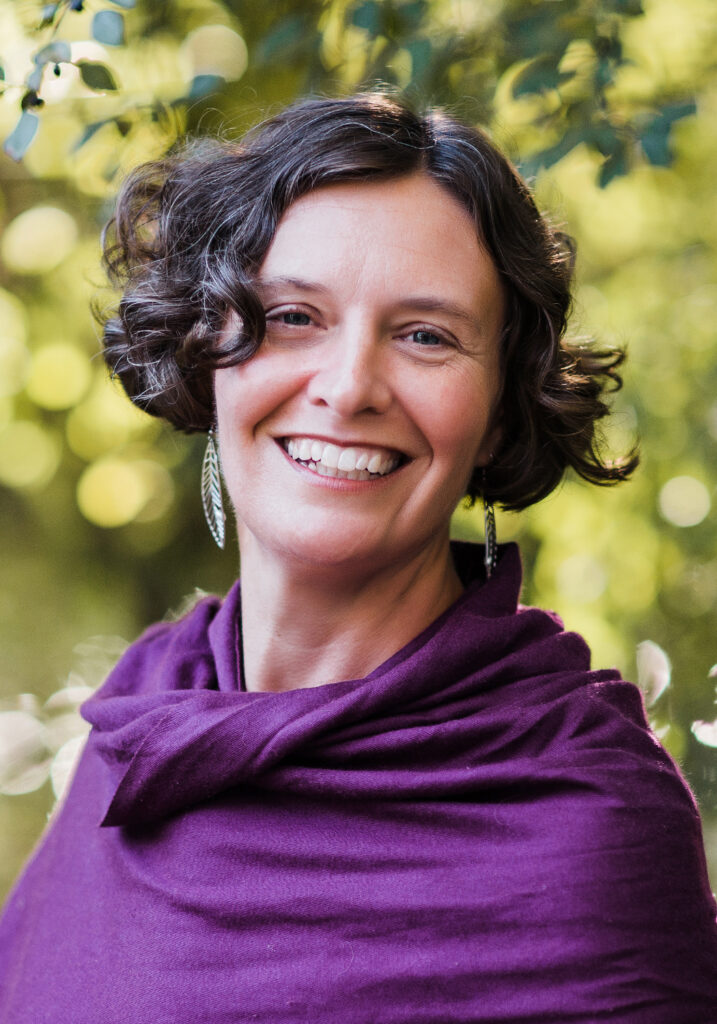Stephanie Heit is a queer disabled poet, dancer, teacher, and codirector of Turtle Disco, a somatic writing space on Anishinaabe land where she is a white settler in Ypsilanti, Michigan. She is the author of PSYCH MURDERS (Wayne State University Press, 2022) and The Color She Gave Gravity (Operating System, 2017).

Stephanie Heit (she/her/hers) is a queer disabled poet, dancer, and teacher of somatic writing and contemplative movement practices. She is bipolar, a mad activist, a shock/psych system survivor, and a member of the Olimpias, an international disability performance collective.
Her first poetry book, The Color She Gave Gravity (The Operating System, 2017) was a Nightboat Poetry Prize finalist and explores the seams of language, movement and mental health difference. Stephanie’s second collection, PSYCH MURDERS (Wayne State University Press, 2022), is a book of hybrid memoir poems that dares the reader to ride the jolt of experimental writing that witnesses and survives shock treatments, psychiatric wards, and suicidal ideation, toward new futures of care. PSYCH MURDERS won the Midwest Book Award Gold Medal for Poetry, the Independent Publisher Book Awards (IPPY) Bronze Medal, and was a Next Generation Indie Book Award Finalist, and Eric Hoffer Book Award Finalist.
Her current project is Every Horizon Turns Liquid, where neurodiversity meets ecopoetic immersion. Enter a world where water is at stake amidst climate change and evolutionary rigor. Meet the inhabitants – human, animal, plant, imaginary – tasked with the future of these biomes. This work emerges out of somatic engagements on Georgia’s barrier islands, Lake Michigan’s shorelines, and other real and imaginary locations. This manuscript was a Nightboat Poetry Prize finalist, an OSU The Journal Wheeler Prize semi-finalist, and the opening section, Water Margins, was a finalist for the Omnidawn Chapbook Prize.
Stephanie’s other current exploration is Mad Conductors, a collaborative performance project with Alexis Riley, that arises out of a desire to transmute and transform personal experiences of electroshocks and psychiatric medication brain zaps. Mad Conductors is an exploration of electricity, shock, connection, memory (loss), and collective mad ways of being.
As part of the Olimpias, she codirected with Petra Kuppers the Asylum Project, an experiential and community practice investigation into the many meanings of asylum, that ran from 2015-2019.
Stephanie’s work has appeared in places such as Poetry Foundation, Orion, BathHouse, Venti Journal, Sonora Review, Bombay Gin, The Texas Review, Ecotone, Anomaly, Dunes Review, Midwestern Gothic, Zoeglossia’s poem of the week, The Hard Work of Hope, About Place, Rogue Agent, Typo, and Disability Studies Quarterly. Her poem “Instructions for Listening to Dead Sister” was a finalist for the Montreal International Poetry Prize in 2024. She has been awarded fellowships from Zoeglossia and residencies from Surel’s Place in Idaho, Blue Mountain Center in NY, The Croft in Michigan, The Thicket in Georgia, and Vandaler Forening in Oslo, Norway. Stephanie has taught workshops and classes at Movement Research, University of Michigan, the Allied Media Conference, Association for the Study of Literature and the Environment, Illinois College, and University of Toronto, among others. Her lifelong love of dance and poetry shapes her offerings along with her training in poetics and contemplative and somatic awareness practices at Naropa University, where she received a BA in InterArts/Dance and MFA in Poetry. Disability culture and her lived experience with mental health difference inform her community engagements.
Stephanie has taught poetry as a mental health worker, taught English in Chile with the United Nations, had a healing arts practice as a licensed massage therapist, and more recently, become a master rain gardener. Her art and life practices are embedded in her love of movement, water, language, the body, different ways of being, and collaboration. She is grateful to be married to Petra Kuppers, her art/life collaborator, who embodies and amplifies those elements. Together they live on Anishinaabe territory in what is colonially named Ypsilanti, Michigan, where they codirect Turtle Disco, a somatic writing studio, out of their living room and in the zoomshell.
Artist Statement
Bipolar is a creative practice for me. It is integral to who I am (as is being a poet and dancer), how I move through the world, what I notice, and to what intensity.”
from “Disability as a Creative Practice” in Mad in America
My creative practice is embedded in my life as a poet, dancer, and disabled person. These disciplines are fluid and inform each other in my work. My inquiries delve into somatic experiences and how the body inhabits the page, words inhabit the body, and how the environment we place our bodyminds in can stimulate new awareness. Water flows through my work as vehicle, home, vibration. Movement creates new choreographies on the page. The page is a site of possibility through my experiments in book arts and letterpress printing. The failure of language has its heartbeats at the edges, of what can’t be contained, an abandoned gesture, spit. Collaboration is also central to my process. Much of my writing is seeded in somatic play with others. This could be with people, or with environments, or both. This crossing of disciplines and engagement with the world around me are key for making. Another important component of my work is the form poems take on the page. Influenced by movement improvisation and choreography, the flow of language on the page, the shape it takes, and the shapes I make out of paper are critical to my work process. I’m interested in the stops, the gaps between movements, stillness, silence.

For more: “Disability as a Creative Practice” in Mad in America shares about my embrace of bipolar as an artistic practice along with dance and writing, how disability constraints and openings shaped my process and the poems in PSYCH MURDERS, and the joys and necessity of community.
Writing
- Selected online writing here.
- Check out Stephanie’s writing on her academia page https://independent.academia.edu/StephanieHeit.
- Download Stephanie’s CV here.
- Check out Poetry & Mental Health Difference guest curated by Stephanie for the Zoeglossia Poem of the Week series featuring work by Nazifa Islam, Roxanna Bennett, and Airea D. Matthews.
Interviews & Podcasts
“Pushing Limits” with Mark Romoser on KPFA Radio Station, conversation about PSYCH MURDERS
PSYCH MURDERS podcast from All Write in Sin City
“The Poetry Show” with Daphne Stanford on Radio Boise, conversation and reading from PSYCH MURDERS
“Crafting Madness: Stephanie Heit on Joining a Lineage of Authors with Mental Health Difference” Naomi Ortiz talks to the Author of PSYCH MURDERS in Literary Hub.
Interview with Stephanie Heit by Martha Stuit in Pulp: “PSYCH MURDERS Examines Shock Treatment, the Aftermath, and How Time and Memory Move in Unexpected Ways”
Interview with Stephanie Heit at Voyage Michigan about her amphibious childhood, how mental health difference has shaped her life, PSYCH MURDERS, Turtle Disco, and disability culture love.
This Earth Workers feature in DJ Lee’s witness:wilderness miscellany explores creating with the natural world, in this case water.
Find out about poet Stephanie Heit’s writing process, book loves, amphibious living, Midwest roots and more in this interview with Midwestern Gothic.
This Dunes Review interview shares interdisciplinary starts, creating in different environments and bodymind states, mad activism, writing in water.